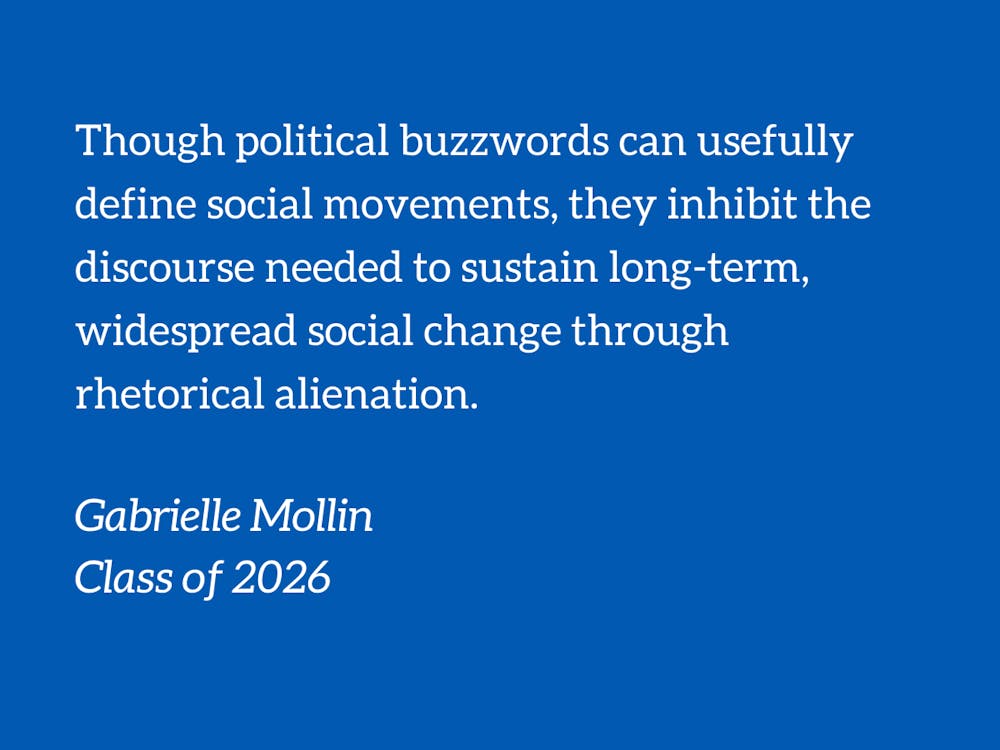It’s 70 degrees and sunny, so naturally, I’m sitting outside Perk Café as I begin to write this week’s column. Though this location likely evokes visions of that one picturesque flower tree and slightly awkward campus coffee chats, I’m reminded of a spirited conversation I had here with a friend over a single word: patriarchy.
Patriarchy means “rule of the father,” but since the late 20th century, the word has mainly been used and understood to refer to social systems where power is concentrated among men. Sociologist Sylvia Walby has articulated six different social structures that encompass patriarchy:
1) The Household, where women’s housework and childcare go largely uncompensated
2) The Workforce, where women are underpaid and overlooked
3) The State, where women are underrepresented and overregulated
4) Violence, where women are statistically more prone to abuse
5) Sexuality, where women’s sexuality is simultaneously stigmatized and aggrandized
6) Culture, where women’s media and popular culture representation operates under a male gaze
But you really don’t have to know who Sylvia Walby is or be particularly well-read in feminist theory to get the gist of the word. It’s used in academic spaces, casual conversations, comedy sketches and so on. And according to Elon Musk, taking a shot for every “patriarchy” in the Barbie movie will leave you blacked out well before its end.
So if this word really is so common, you might be wondering why I had a two-hour debate about it with my close friend.
First, context. This friend is a woman. She recently told me that while she acknowledges the existence of sexist individuals in the world, she doesn’t believe we live in a patriarchy.
Right off the bat, I found myself up in arms about her comment. I was shocked, shocked because I assumed that as a woman, she would undoubtedly share my perspective. The existence of patriarchy felt like a no-brainer to me. It was a concept my friends and I all understood as reality, allowing us to have meaningful conversations with each other about distinct school or work experiences and crack a few jokes while we were at it. The fact that this friend didn’t believe in a concept I and nearly everyone around me deemed an almost fundamental part of our lives seemed, well … strange.
To remedy this seemingly stark divergence in beliefs, we immersed ourselves in conversation outside of Perk Café for a solid two hours. From biological differences and evolutionary history to women’s exclusion from the political process and workforce for the majority of American history to present-day implicit biases and sexual violence, we covered almost all the bases. And in avoiding my homework and midterm studying that day in pursuit of dynamic conversation, I came to a valuable conclusion: We didn’t actually disagree.
After a heated first 30 minutes debating the plausibility of male and female equality due to different perspectives on the influence of social and biological forces, we came more or less to an agreement. We both shared experiences of being overlooked in the classroom or workplace. We both found comfort in sharing our excitement about our future careers, but also our anxieties about the seemingly impossible task of balancing motherhood and work. We vocalized our frustration for how the state seeks to regulate women’s bodies, yet fails to legislate policies to protect them. And throughout all of this, not once did either of us use the word patriarchy.
What I came to realize was that our disagreement was not one of content, but diction. When it came down to it, her convictions more or less acknowledged the existence of patriarchy; her aversion was not to the concept but to the word itself. Just like with Elon Musk or Ben Shapiro and the Barbie movie, my friend had a problem with the word patriarchy, which is why our conversation became all the more productive when I stopped using it and other feminist buzzwords altogether.
And that’s the thing: Productive conversations don’t include buzzwords. Though political buzzwords can usefully define social movements, they inhibit the discourse needed to sustain long-term, widespread social change through rhetorical alienation. Yes, buzzwords are practical shortcuts that can underpin complex issues, but they preach to the already converted.
A word like patriarchy, which to me and others in feminist spaces seems perfectly legitimate, is nothing more than an annoying buzzword to many. It’s viewed as a way to control political discourse and impose a certain viewpoint as plain old common sense. And when someone doesn't know the meaning of a buzzword or views the buzzword as political posturing, genuine discourse shuts down at its mention. Although convenient, buzzwords have unparalleled polarizing potential.
So why cling to words that hold meaning for a few when we could have conversations that appeal to many? It’s time to bid adieu to the buzzwords we know all too well and step into real, unscripted conversation. Once you do that, you, like my friend and I, may find your disagreement wasn’t really that much more than a (buzz)word or two.
Gabrielle Mollin is a Trinity sophomore. Her column typically runs on alternate Thursdays.
Get The Chronicle straight to your inbox
Sign up for our weekly newsletter. Cancel at any time.

